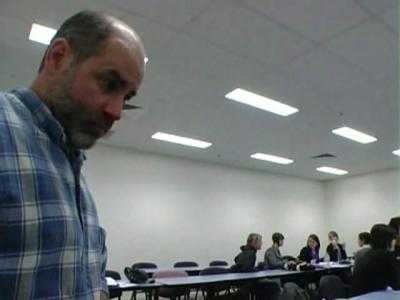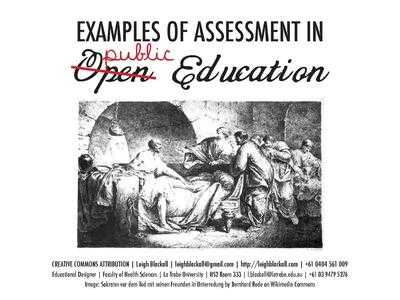Assessment in open education
This presentation was initially prepared for the Faculty of Health Sciences at La Trobe University. La Trobe's Centre for Teaching, Learning and Curriculum asked me to present in to their Scholars of Learning and Teaching (SoLT) seminar series on Tuesday 12 March 2013, which coincided with La Trobe's Open Education Week event.
Introduction
This session will look at examples of open and networked learning and discuss the practical opportunities to university teaching work, and the underlying principles of such practice – principles that seem to challenge, inspire and confront the practices typically found in today’s universities including community engagement, research, teaching and assessment. The related field of Open Educational Resources and Practices are having a growing influence in Australian universities, and this session presents an approach to OERP that has been piloted at the University of Canberra (2011) and Otago Polytechnic (2009), and now La Trobe University’s Faculty of Health Sciences.
I am interested in open and networked learning, including in academic practice. Here I will briefly talk about assessment methods I've been involved in, that seek to bring together community engagement, research, publication and peer assessment in an open and networked way. I hope to stimulate discussion with these ideas and projects, and challenge, inspire, and confront traditional university based practice.
Examples
- Psychology student authored open textbook
- Sport studies open and networked course
- Journalism course with Wikinews assignment
Psychology student authored open textbook

- Formal textbook was inadequate and expensive
- Essay assignment changed to textbook chapter
- Finished textbook became basis for next semester, with eBook and printed option
- Assessment was formative and included peers
Sport studies course
- Simple Google search gains access to the course
- Essay assignment into published papers in a student authored journal
- Presentation assignment 'screen based'
- Exam made 'open book' with wireless Internet and questions that were impossible to answer individually
Journalism course with Wikinews assignment
- Problem of quality in a troubled sector
- Wikinews found to be a quality news outlet using innovative and contemporary methods
- Assignment: get a story published on Wikinews to pass
- Assessment assisted by Wikinews volunteers
- Wikinews invited more faculty engagement
See notes on Wikiversity - http://en.wikiversity.org/wiki/Journalism_studies_and_Wikinews
Principles of practice
- Situated and convivial
- Community engaged, relevant and useful
- Permeable boundaries, networked, participatory
- Transferable/sustainable
- The skills, instruments, methods and content can transfer across platforms, institutions, across a reasonable public skills base
- Open and transparent
- Accountable, verifiable, open data, responsibility
Work in progress - http://en.wikiversity.org/wiki/User:Leighblackall/An_ethical_framework_for_ubiquitous_learning
Suggestions
- Use Wikipedia etc as assignment, assessment and learning platforms
- Use Wikiversity to document teaching and research work
- Use Yahoo Answers as an assignment space
- Use Blogger for journal based learning and professional portfolios
- More ideas for activity, assignments and assessment - http://en.wikiversity.org/wiki/Activity,_assignments_and_assessment
Supporting initiatives
- NHMRC mandates open access publishing
- ARC follows
- Australian Gov implements reusable copyrights on public service information
- 12 years of foundational funding
- Wikimedia Commons medical information initiative
- Wikimedia Australia support
